#(the previous regarding posts; usually quotes or references; I hold in the highest regard)
Explore tagged Tumblr posts
Text
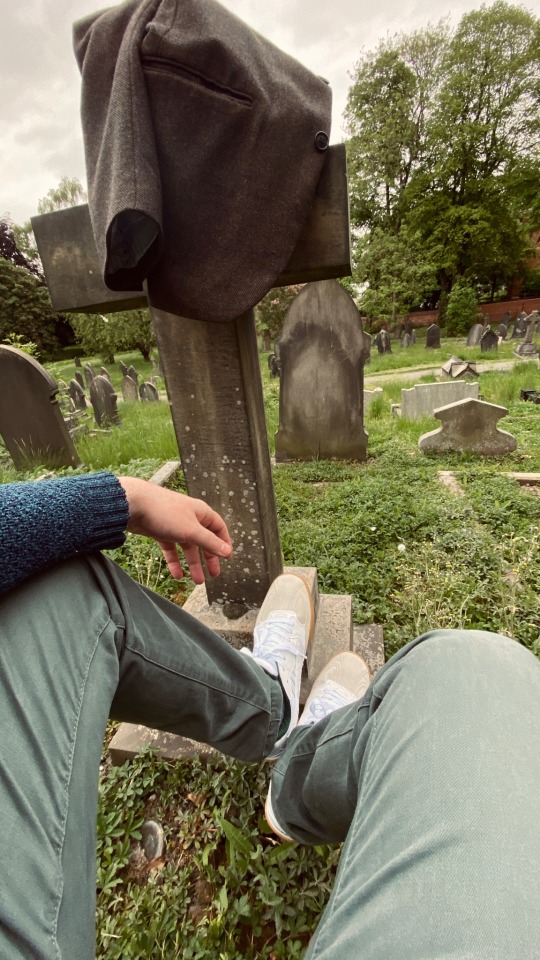
:: Heidegger said spare time is ecstasy ::
But Cordelia is the quiet absolute; her very silence is the still centre of the turning world.
— Ann Pasternak Slater 🐚
… and yes I said yes I will Yes.
Trieste-Zurich-Paris,
1914-1921.
(my name’s John; England is mine and it owes me a living, etc., 📻)
// Spotify 🎧🌻
:: personal sensibilities ::
• Comitting to intellectual freedom, while disavowing and attacking ideology:
To be clear, an ideology is by definition a belief system with an inadequate basis in reality, and therefore always vulnerable to the recourse of violence (verbal and/or physical) whenever it is moved to defend itself, especially when those areas of reality-inadequacy are being highlighted. Furthermore, an ideology is in the business of aggrandising those who subscribe to it, and by definition demonising those who do not.
Solzhenitsyn wrote, ‘Physics is aware of phenomena which occur only at threshold magnitudes, which do not exist at all until a certain threshold encoded by and known to nature has been crossed. Evidently evildoing also has a threshold magnitude. Yes, a human being hesitates and bobs back and forth between good and evil all his life, but just so long as the threshold of evildoing is not crossed, the possibility of returning remains, and he himself is still within reach of our hope.’ He went on to say: … ‘The imagination and spiritual strength of Shakespeare’s evildoers stopped short at a dozen corpses, because they had no ideology.’
Ideology, along with organised religion, brings about a disastrous fusion: that of violence and self-righteousness; this allows for a savagery without stain. It provides in humans an inbuilt circuit-breaker for recognising the threshold magnitude of an evil.
• Judging or interacting with the individual on merit alone; I couldn’t care less about your perceived (actual or imaginary) disadvantages or sufferings (of an associated group or you as an individual). That’s not my problem, nor should mine be yours; to expect preferment due to them is inherently perverse and dangerous.
To be clear: I’m talking individually here, not nationally / economically; the state has certain responsibilities to all its citizens, each to their needs; this responsibility is derived from both the taxes and the social contract a polity obliges from its people.
• A disavowal of the reflexive notion that our basic sense of what is Good and Evil is reduced to the following myopic formula:
Good people or ideas = (come from) the powerless.
Bad people or ideas = (come from) the necessarily powerful.
This ought to be seen as self-evidently pernicious and inimical to any notion of development on both a personal and societal level, but somehow today is the default in western mainstream discourse. I reject it wholly and am repelled by those who promote it.
• A disavowal of race obsession; society should endeavour to be by default colourblind, while maintaining and celebrating without prejudice the multiform cultures and traditions that embody the said society, within the laws of that said same. Promoting preferment or demotion or the throttling of opportunity due to race is inherently perverse, retrograde and dangerous.
• A refusal to replace ideas with ‘identity’; your ‘identity’ is not a catch-all accessory that inures you from your actions or your espoused ideas; it is not a shield, yet it can often be a marker for your obvious subservience to an ideology, and due to passed enormities of said ideology you shouldn’t be surprised if people, and myself, don’t want anything to do with you. You’re a human being, not a capriciously customisable gnostic mannequin.
• Debate over denunciation, persuasion over mere public shaming; don’t tell me how I should think and feel about a person or idea. Ex cathedra positions are hard-won and earned; presuming this position without merit is absurd and should be exposed, and furthermore, if you’re able to and in the mood: mocked, whenever encountered.
• The rule of law over the self-righteous fury of the mob; history teaches that the mob is capable of all and any depravity, and always feels justified in the act, however obscene.
• That said, it is vital to understand that an uninformed majority will always lose a battle for information against an informed minority; it’s important to notice when a manipulative minority is holding an unaware majority to ransom. This is, again, particularly prevalent when dealing with ideologues.
I’m always open to respectful criticism or debate, or even just discussion, about these views : feel free
#personal posts are logged under following:#n.#other tags:#my books#high table#(the previous regarding posts; usually quotes or references; I hold in the highest regard)#music#for reference
74 notes
·
View notes
Text
Re-watching Joker Game: Ep 7 Code Name: Cerberus
So, as I proposed a re-watching, here I go continuing on doing the re-watching. Hopefully someone else will join! ^_-
Also, hopefully there’s someone out there that read all this stuff… as I know it’s pretty long… shame on me for analyzing things too in deep…
Mind you, what follows are my ramblings over Ep 7, comprehensive of my impression on how the frames were structured and so on with some occasional reference to the other Joker Game media.
Also, for personal comfort, I’ll use the characters’ names even if the anime hasn’t stated them yet. In short, as this is a re-watching and not a first watching, you’ll also get a telling that’s mixed with my knowledge of the future. Consider yourself warned.
Last but not least, many apologies for posting this so late but real life kept me rather busy this month…
And now, let’s start.
So yes, like in the previous episode I starts with the preview for this episode that was in Ep 6.
Now, we’re again in whatever place the previews take place.
Anyway in this preview we’ve Amari and Hatano.
Amari is folding a paper as he asks if there wasn’t an artist, a painter to be specific, who compared life to an ocean voyage.
Hatano answers quoting something “You start rowing from a small stream, enjoy the peaceful scenery, endure the wind, survive the storms,” while Amari keeps on folding the paper until he has obtained a boat. Then Amari finishes the quote for Hatano, “And flow into the ocean. What awaits beyond is boundless freedom,” before blowing on the ship causing it to fly away from his hand.
Sorry but I wasn’t able to find the painter who said the quote Hatano and Amari are referencing. If someone has more info I would love to hear them.
The preview is a reference to how the next episode will take place on a boat… but it can be seen also as a reference to how Amari will technically leave D Agency and move to Hawaii to take care of little Emma… because that’s what truly happened in the end even though the whole fandom, Miwa Shiro included, prefers to think he came back to D Agency with Emma. But well, we love Amari and we don’t want to lose him.
This is sadly the only interaction we see in the Joker Game anime between Amari and Hatano (in the manga they interact a little more).
And now let’s dig into the episode.
The episode opens up in a rather dramatic way.
As ‘Tōryaku’ [韜略 River] play in the background the scene opens showing us that there’s fire and people tied in the middle of it. Some of them seem dead already. One though is on his knees, panting hard, blood dripping from his side. There’s someone in front of him and it’s probably that someone who orders to plant explosives in the ship’s hold, twice the standard amount.

The wounded guy raises his head at this, eyes widening in shock.

Next we see is that the one speaking is a German, clearly recognizable due to the iron cross he’s wearing.
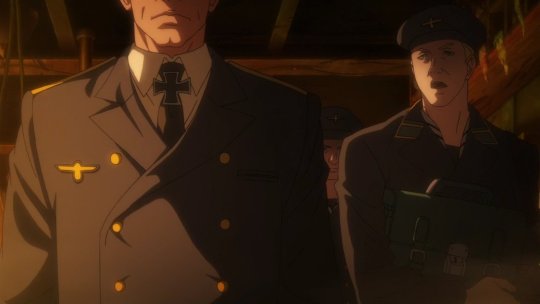
The one next to him asks about what to do in regards to the ship’s crew. We see that there are people still alive, closed in the engine room of what is likely a boat, banging on a door and asking to be left out…
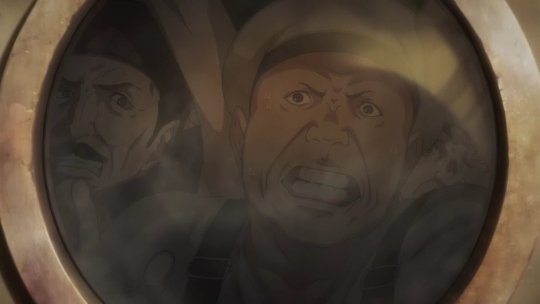
…and soldiers outside the door keeping their arms raised against it so as to make sure they won’t manage to come out.
Anyway the German in charge comments that, as their information said, they had the instructions so they won’t let evidence behind, implying they would kill everyone. As the panting guy screams him to stop he raises his gun with a grin and, as the screen becomes black we hear a shoot, a clear hint that the panting guy was killed.

Now… Ep 7 has an awesome colouring, one of the best through JG. The fire is beautifully bright and I love how the room gets an orange tinge due to it.
But hum… back to the rest. This bit lasted exactly 32 seconds but it had a high dramatic value. At first we don’t really see the Germans, we’re just shown their victims. The bound people who’re either dead or unconscious, the bleeding sailor on his knees (to make things simpler I’ll tell you he’s Raymond Grane, even if we’ll discover this much, much later), the horror on his face as the German imply they’ll kill everyone, the crew begging to be left free.
We catch glimpses of German soldiers to show us that they’re actually in control of all those lives. The soldier who asks about the crew when they’re about to blow up the ship, the soldiers who’re guarding the door so the crew can’t escape. They’re the ones in power… but they’re actually not really acting, they’re just there, like objects. While what they’re doing is cruel and horrible… they don’t seem to either get pleasure or displeasure doing it. The question about what to do with the crew is said in a neutral tone, as some sort of clarification on the orders. In short, they’re represented as people who’s just there to obey orders regardless.
The one who’s really in power is the German officer… and that one came clearly out as a jerk.
It’s meaningful how his face isn’t showed until he gets the chance to express what sort of jerk he is.
We know he ordered to use twice the standard amount of explosive so as to make sure the ship will blow up… but we can assume he too is being a puppet obeying to orders. When asked about the crew… he sounds almost concerned… but it’s actually a mocking tone. When we finally see his face we hear him ordering what to do in regard to the crew. His order implies they all have to die and, once he gives it, he grins.
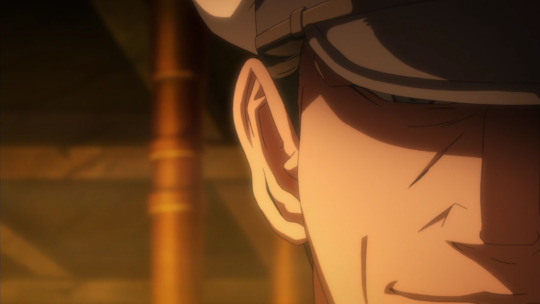
He’s not doing this in the impersonal manner of someone following orders. He’s enjoying it. He also grins again when he shoots at Raymond.
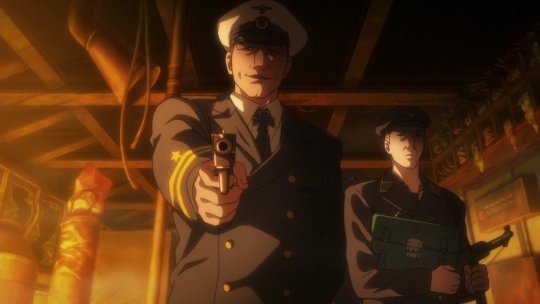
He has a very small role with few sentences, but it’s clear it’s not a good guy.
While JG often paints the Germans as jerks, in this case this is an interesting choice because that German was actually not being the ‘real cause’ due to which everyone died. It’ll turn out it’s McCloud, an Englishman like them, Raymond’s friend, who sold them out to get information.
Those people’s lives to him weren’t that important. So, even if the German is a jerk for enjoying what he’s doing… how much horrible McCloud is at backstabbing those people knowing the Germans would have very likely killed them all? Civilians, one of whom his friend?
It helps to make more understandable why Synthia’s hate, who should have been directed to the Germans who were actually the ones who physically killed her husband, actually turned on McCloud, the family friend who pretended to share her pain when, in truth, he sent her husband to death.
It’s 1940, they’re at war, the Germans are enemies from which they shouldn’t expect mercy… but McCloud was an Englishman and a friend. And caused Raymond’s death just the same. And no, it wasn’t to save English lives. It was so that he would look cooler. But let’s go back to the story.
Oh, not too sure if someone is interested but when the German guy raised his arm we could see his rank insignia and they label him as a Oberleutnant, the highest lieutenant officer rank in the armed forces of Germany. Among the voice actors he’s just labeled asドイツ海軍士官 (Doitsu kaigun shikan) which means “German Navy Officer”. No reference to his ranking is made. Personally I was expecting him to have a higher ranking (he even seems older than Bauer or Sakuma) but maybe it’s just me.
BTW Raymond Grane, according to the ranking on his hat and sleeve is a first mate (or chief officer or chief mate, do your pick, all those names work). Amari too will confirm this, later on.
‘Kikan’ [機関 Agency] starts and we gets Amari telling us the usual shortened version of the explanation of what D Agency is.
Then this ends and we get…
…the opening. Which is the same as usual. Amari is the forth spy that appears in it and we see him smoking and then smiling at the camera. If he does something at the end of it… well, I didn’t realize it (maybe he’s the one who smiles? I’m not sure though…).
Anyway the opening ends and we resume with ‘Joker Game’.
‘Yōkō’ [陽�� Sunshine] begins to play and we start… with a big cruiser boat, the Tokimaru (朱鷺丸).
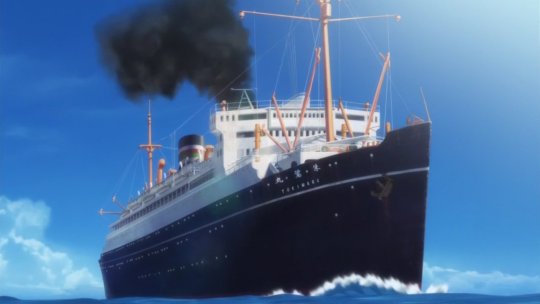
The ship is currently sailing close enough to see some islands (which will turn out to be the Hawaii) so the passengers are on the bridge watching them. The ship’s captain confirms that they’re the Hawaii and that they should be docking in Honululu in three hours.
The contrast with what happened on another ship in the scene prior to the opening is staggering and it’s even increased by colours. While, due to the fire, the previous scene had a marked yellow, orange and red tinge, here the predominant colour are the blue of the sky and the sea and the white of the boat and of the sailors’ clothes, of the deckchairs and, of the clothes of someone who’s sitting on a deckchair (though, to be honest, they’ve a pale yellow and not a perfect white).
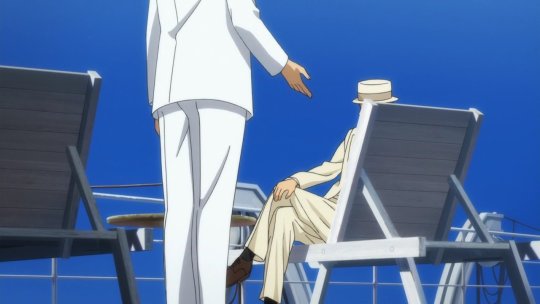
Anyway the first mate goes and ask that person if he’s not going to enjoy the view like the others. We can’t see that person face at first then he moves and… well, hello Amari!
Amari is dressed quite differently from usual and not because he’s not wearing his usual grey suit. In fact, we can see that instead than a tie he has a bow tie and instead than a fedora he has a pork pie hat, braces instead than a belt and no waistcoast. Maybe he’s meant to look dressed with an American flair since the ship is traveling from San Francisco to Japan (with a stop to Hawaii)?

Oh well, it’s not really a problem.
Amari claims he’s a little preoccupied… and then we’re shown what is tormenting him. A crossword puzzle. Before wondering if Amari is that obsessed with crossword puzzles or prone to worry over minor things give him a moment.
He starts asking help to the sailor in order to end the crossword puzzle... and that’s our clue. The D Agency boys were so very knowledgeable that it’s weird that Amari would be stumped on a crossword puzzle… for answers that a normal sailor can give him.
Well, to be honest the sailor can only give him an answer as he gets stumped as well at the next word. Anyway, as the two of them are talking, they hear a woman screaming “No! Stop! Stay!” in English, our clue that she’s English.
As the woman screams we don’t see her face, just her mouth…

…and then we’re shown the shadow of a small dog, a Scottish terrier, running in between the legs of the passengers.
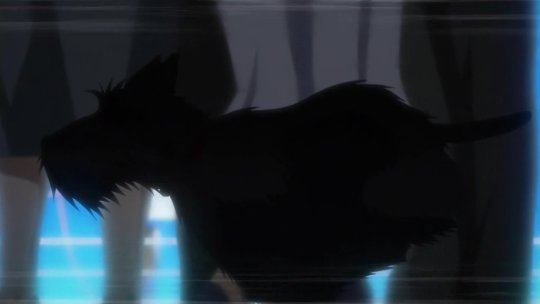
The dog then turns a corner and appears close to where Amari and the First Mate are and runs past them and away from a woman, holding a child in her arms and now leaning against a wall.
Though the woman is far from Amari and the First Mate and much closer to the other passengers, none of them move to check on her, just Amari and the First Mate… which is, in my opinion, a bit weak. Amari is the first to reach for her and ask her what’s wrong. She claims a dog ran out of nowhere and startled her daughter, then put the little girl down. Now… maybe it’s a subbing problem but the one who seemed freaked out was the mother, not the little girl which seems weird.
Sure, later it’ll turn out the woman is actually lying but the lie is pitiful in itself as it would have worked better if she had said the dog startled HER.
Anyway, Amari bend down and asks the little girl to come with him. In present time it would be very weird for a stranger to do this but it seems back then it wasn’t a big deal. The little girl though is shy and moves closer to her mother. At this Amari whistles and causes dolphins to start jumping out of the water.
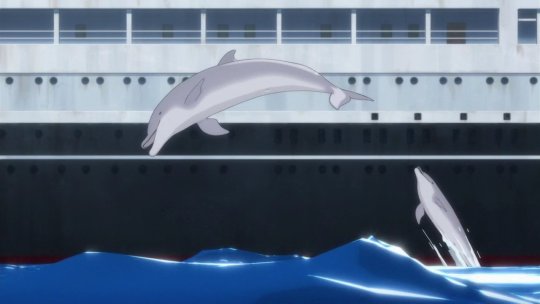
Now… I wonder if this is possible as dolphins aren’t trained dogs but well, let’s let this slide.
‘Sakura haru’ [桜春 Spring of cherry blossoms] starts playing as the little girl, Emma, is delighted that dolphin have appeared. This time Amari asks her if she feels like going to see the dolphins together and she accepts, allowing him to pick her up. Amari winks at the mother, who smiles at him and, after turning to the first mate likely hinting at how he entrusts the mother to him, carries the little girl to see the dolphins asking her what’s her name, to which she replies ‘Emma’.
Yeah, as many pointed out, in present time the whole thing feels weird as mothers shouldn’t entrust their little daughters to random strangers but whose were other times.
The mother seems to feel sick again (as I’ve said before either the subs messed up or the whole my daughter was startled doesn’t really work well as she’s the one who basically is feeling sick…) so the first mate asks her if she would like to return to her room, to which she replies she’ll be fine if she’ll rest a bit.
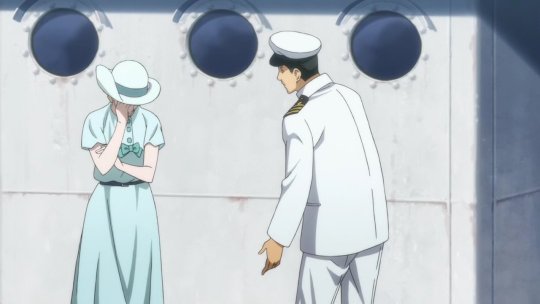
Meanwhile Emma is counting the dolphins jumping out of the water…

…and it’s surprised when, after counting five, she can’t see them anymore so she asks Amari where they went… to which he offers back to their home… which… hum… again is a bit weak as he could have whistled again and make them appear again, if it’s that what he did the first time. Emma wants then to know where’s their house, to which he has no answer.
Overall it’s a very pretty scene.
Emma’s mother, Synthia, joins them, thanks Amari, claims she feels better and gets Emma back. Emma is happy to go in her mother’s arms…

…and, other her mother’s prompting, thanks Amari, who replied it was a pleasure.
Now… in the book Emma was around 2. In the anime she looks older, around 4, and she can walk, but she will be mostly carried around in people’s arms which is a bit weird.
Still, Emma comes out as a loveable and cute child.
It’s also worth to note that Ep 7 is possibly the most visually pretty episode of Joker Game, both in terms of colours, composition of the images and effects.
I’ve mentioned how beautiful it was the fire in the intro scene but the sea is also awesome, both when we see the dolphins underwater, in which they use a wonderful effect to express the water refraction…
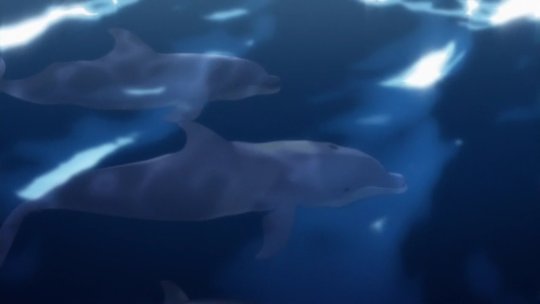
…or when it’s just in the background with the waves moving on its surface.

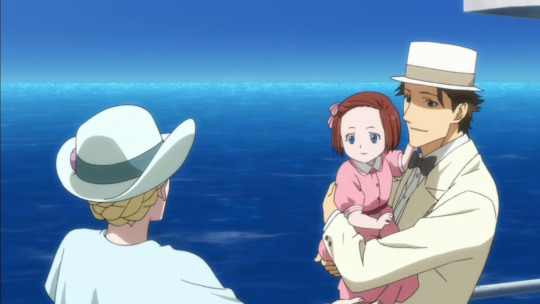
The characters are usually not static, which further proves the care used to animate this. Overall it’s definitely one of the most visually nice to watch if not the nicest.
We’re shown the ship continuing on its cruise, but it’s just a quick glance to help us smoothly accept the transition from a scene to the other. The Tokimaru won’t definitely be shown as often and with the same care as the Asia Express. On a sidenote the Tokumaru very likely is a fictional ship based on the Japanese ocean liners owned by Nippon Yusen Kaisha. Although the anime changed things a little, in the novel, this story was partially based on something that happened to the Asamamaru, so, very likely, the Asamamaru is the model for the Tokimaru.
However, since the whole thing was a diplomatic incident and a complex one, the anime preferred to change things a little and have a fictional boat (also the incident took place on January so, if they wanted this episode to take place in summer, they had to change things).
Anyway, due to all this, JG likely didn’t feel like the Tokimaru deserved the same attention that Asia Express got.
Back to the story and to Amari who tries to get back to his crossword puzzle to find a man peering at it curiously.

The man explains he was passing by and couldn’t help but be attracted by it. It’s very nice how they handled his body language.
Anyway he introduces himself as Jeffrey Morgan, someone who runs a small trading company in San Francisco. Amari presents himself as Osamu Utsumi, a Japanese engineer. As he’s giving out a fake name it’s clear that Amari is on mission.
Morgan admits he can’t walk away from a crossword puzzle…
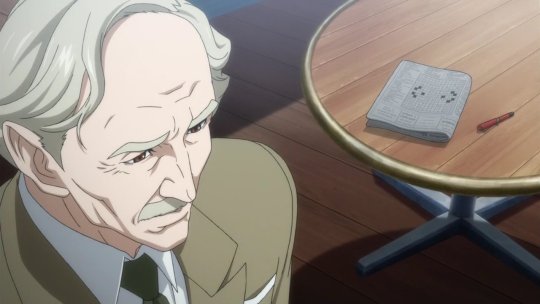
…and Amari claims it’s perfect as ‘he’d like to borrow his knowledge for a bit’. It’s not so hard to guess Amari isn’t just as obsessed with crossword puzzles but he has ulterior motives for his invitation.
Anyway the two sits down.
The next we see as two glasses filled with what looks like sparkling white wine.
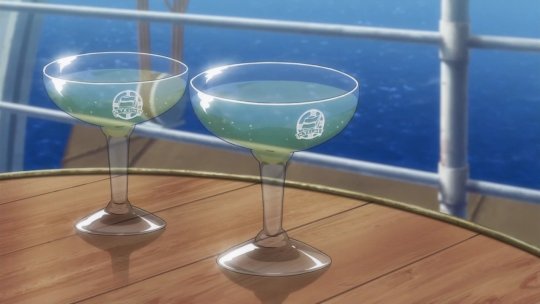
They’re relevant but the problem is ‘how had they gotten there?’. The two had apparently just sat down and yet there’s already wine served for them… which wasn’t there moments before, when they met (just look at the previous pictures and you’ll see no glasses on the table) and the one in the glasses is not just ordinary wine… not mentioning they won’t touch it for a while so they clearly hadn’t ordered it because they were thirsthy.
This is fundamentally the weakest point of all the episode… but we’ll discuss about it later on. Amari in the meantime is reading clues while Morgan is giving him the answers.
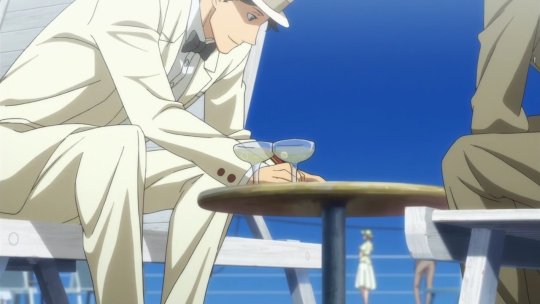
Amari then reads a definition “Variations, six letters,” and if we pay attention to his expression it’s not casual anymore and his eyes are kept in the shadows even if they’re looking at Morgan.

Even if it’s not overly obvious it’s a visual clue Amari is up on something. The other reacts with surprise at the definition then gives the answer. ‘Enigma’. Due to Amari’s confusion, Morgan explains that Enigma is also the name of one of composer Elgar’s masterpieces. Turns out that in the piece there are various still unsolved riddles and this helps Amari to switch the discussion on another unsolvable mystery, the encryptions made with the Enigma machine Germans are using.
Amari starts to sing praises of the Enigma machine and Morgan also adds some info about how the German Army improved it. Amari then claims that the movements of the German U-boats that had Enigma-encrypted orders would be completely unpredictable and this pushes Morgan to challenge that statement claiming that any form of encryption can be broken as long as one has a little hint.
Morgan is thinking that, if they were to have a message whose text they know, encrypted with an Enigma machine, comparing the two would give them clues… which is basically how the Rosetta Stone helped people to decrypt hieroglyphic scripts.
At this point Amari reveals his true face. He praises Morgan for being a really smart man in an amused tone then explains that since the Japanese Navy is also developing encryption machines based on the Enigma technology…
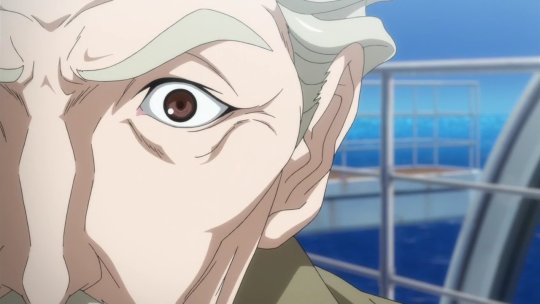
…they can’t let him slip inside Japan by pretending to be an American.
Please, note this as well. Amari says that Jeffrey Mordan is claiming to be American. It’ll get relevant later on.
Morgan is surprised, Amari rolls the newspaper and claims Morgan’s true name is Louis McCloud, whose codename in his country intelligence agency is “The Prof”.
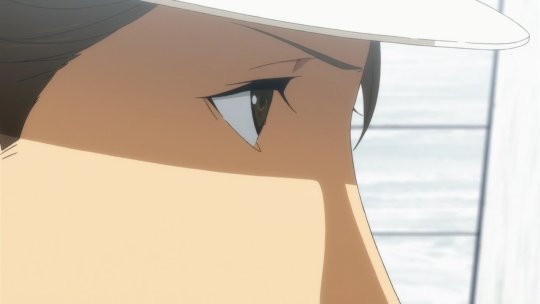
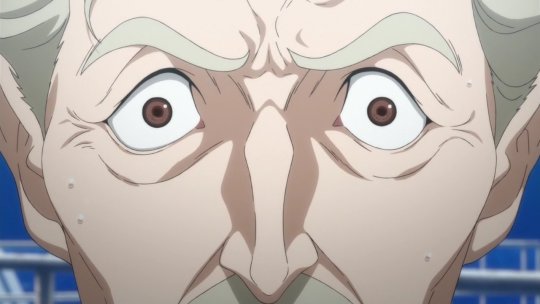
Morgan, or better McCloud, bends on himself, as if defeated and claims that Amari is “Cerberus” before pulling out a blade that he kept hidden under the leg of his pants and using it to attack Amari.
While the movement is really plastic… well, it also seems pretty unnatural. The Settei book shows the first draft for that scene and that one looked a lot more natural even if maybe less spectacular.
Anyway Amari blocks the knife with ease using the newspaper…
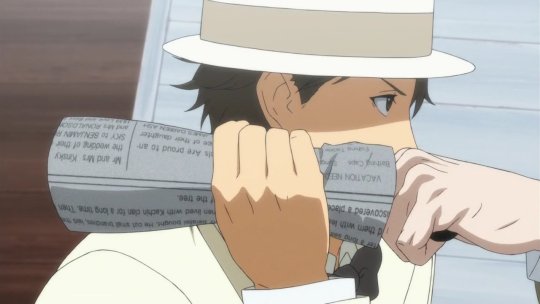
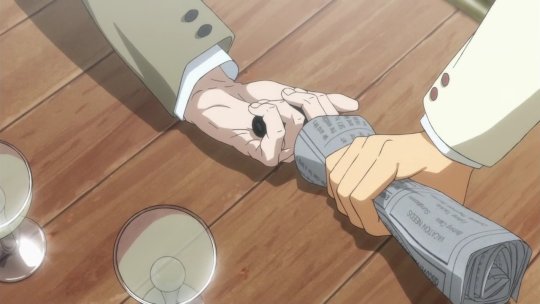
…and presses his fingers against McCloud’s neck claiming he could use fingernails to cut his carotid artery…
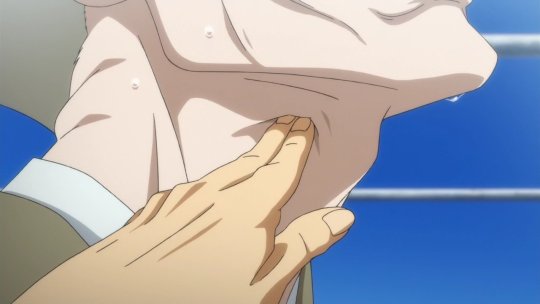
…and here I’ll admit I’m not really knowledgeable enough to tell if this is possible or not as I’ve never tried killing people with fingers (on a sidenote how sharp Amari’s fingernails are?).
More likely though, he’s planning to kill him not by cutting his artery but by pressuring it so as to cause a vagal inhibition which can kill you really quickly. Either that or he’s bluffing… though, of course, claiming he’ll cut the artery with his fingers is way cooler than claiming he’ll cause a vagal inhibition so maybe they changed things on purpose.
McCloud gives up (probably understanding that Amari isn’t out to kill him and therefore he isn’t Cerberus) and Amari catches his chance to toss the knife in the sea.
McCloud starts questioning Amari on how he could recognize him since he undertook a huge amount of plastic surgery.
Amari explains he had only few bits of random intel on him like how he’s unable to ignore crossword puzzles and how the clues in the crossword puzzle were also tailored for McCloud. Still Amari claims that, despite the plastic surgery he could recognize McCloud even without the crossword puzzle because several of his facial features matched the picture he had as, like fingerprints, there are some things unique to each individual (we’ll discover later he’s talking about McCloud’s ear shape).
Now… okay, I don’t really get the plan here. Amari can force McCloud to disembark on Honululu and not get in Japan… but what after this? McCloud can always try using the next boat to reach Japan since Amari isn’t going to kill him. Wouldn’t be better to let him reach Japan and then arrest him there?
Unless part of the plan got cut due to time reasons this bit feels confusing.
However at this point the discussion between the two is interrupted. A ship is appearing.
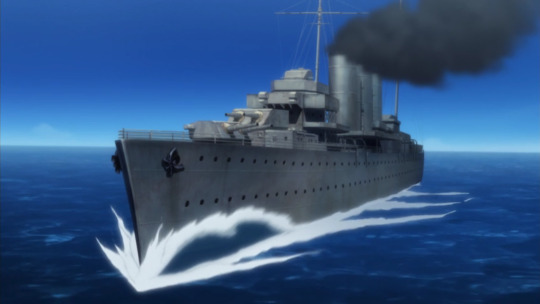
‘Keiryaku’ [計略 Strategy] starts playing as people think the ship might be a Japanese one, then it turns out it’s not. What’s worse the ship shoots a cannonball close to the Tokimaru, causing the people on board to panic.
Allow me a second to praise how each passenger has a different face.

After firing the shoot we can see they have the English flag and that are raising another flag that means “Stop your vessel at once”.
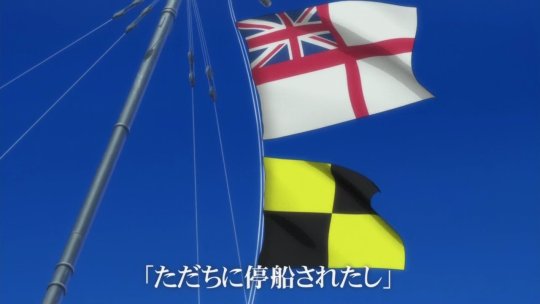
McCloud confirms for us that the ship is from the Royal Navy in case we didn’t recognize the flag.
Behind him we can see people panicking and escaping. It’s worth to point out that, back then Japan and England weren’t at war yet. But we’ll discuss about this in a while.
McCloud feels confident, claiming he had fun playing with Utsumi’s (Amari’s) crossword puzzle and then, claiming this is a goodbye, picks up one of the previously mentioned glasses and drinks from it.
A music starts playing but I can’t recognize it. Sorry about it. Anyway as soon as McCloud drinks he starts to feel sick, drops the glass, begins to claim that Utsumi is Cerb… then dies.
‘ Seion’ [静穏 Quiet] starts playing.
The scene switches and we go back to the Greater East Asia Cultural Society. It’s clearly a flashback in which Yūki is handing Amari the current case. Yūki taks to him about Louis McCloud, showing him photos of the man…

… and telling Amari the man was hired by the SIS during WW1, working on decrypting German communications. He hads the man has changed his face and plans to travel from America to Japan. As Amari reads the documents at an amazing speed, Yūki tells him not to let McCloud set foot in Japan… and so this confirm my confusion. Even if Amari were to cause the man to disembark at Honululu what would stop him from coming in Japan with the next boat? And why McCloud felt relief when he saw the English boat? Amari had told him his purpose was to stop him from coming to Japan and, apparently, McCloud had figured out Amari wasn’t after his blood so even if he were to leave with the Royal Navy McCloud would still not manage to go to Japan and Amari would have won just the same.
Definitely there’s something missing in the plan but I’ve no idea what it is.
Meanwhile, as Amari stares at McCloud’s photo he says ‘Garderning plan’ and this is confusing because that’s the first time we hear about it, and we might think it’s Yūki’s plan for McCloud, not McCloud’s plan.
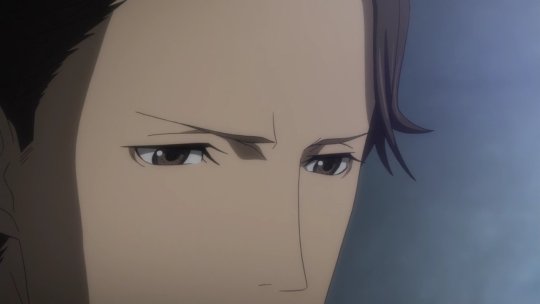
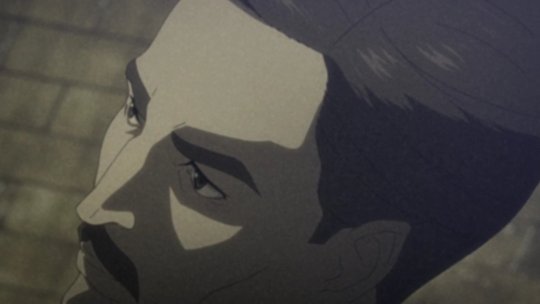
Sure, it was probably meant to hint at how Amari got info on what McCloud did that caused Synthia’s husband’s death but, right now it feels a bit random. But well, if that was the plan it wasn’t bad as an idea… only I fear it’s too distant and obscure to help people connect the dots at a first watch.
We’re back to the ships. Small boats are moving from the English ship to the Tokimaru.
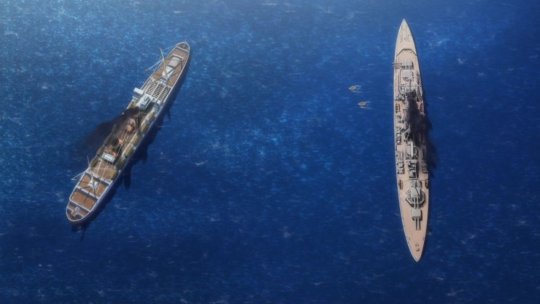
Meanwhile the captain of the Tokimaru is questioning Utsumi (Amari) about Morgan (McCloud). Amari insists he just met him on the ship and so he didn’t know him and asks the cause of his death. The First Mate tells him it was due to cyanide poisoning. Hum… I’m not sure it’s a smart idea to give out info to Amari as he should be suspected but now I can finally rant about how the glasses were a problem.
In the Anime the glasses appeared on the table after Amari and McCloud started doing the crossword puzzle. They contain what is apparently the same drink. Now, as they contained apparently the same drink and McCloud picked up one at random, this means BOTH were poisoned. However we see no one coming close to them and poisoning them.
This should mean that poison was already inside them when they were delivered… but when they were delivered?
This is unknown. They weren’t on the table before Amari met Synthia and they aren’t on it when he goes back to his crossword puzzle and sees McCloud staring at it. They’ll just appear after Amari and McCloud sat down and started doing the crossword puzzle.
In order to deliver the cyanide the assassin should have seen them sitting down together, and then either poison both the drinks they ordered, or send them poisoned drinks with an excuse.
I’m saying ‘send them’ because the assassin apparently didn’t deliver them personally or Amari would have recognized that person (SPOILER AHEAD: the assassin is Synthia so if she had delivered them personally Amari would have suspected her way sooner). The problem however here is ‘how did she poison the drinks without being noticed by the one carrying them?’ and why no one checked from where the poisoned drink came from?
In the original version this story was pretty long, and even cut in two parts so it’s possible that this is all due to the anime having to cut too many things. Sure is the mystery part gets incredibly weak, which is a pity.
Anyway, back to the story, Amari thinks at McCloud’s dying words and figures that McCloud was targeted by someone whose codename was “Cerberus”.
The scene switch and we’re on the bridge of the ship. The English sailors have come aboard and the Tokimaru’s captain is protesting for what they’re doing, claiming they’re violating international law.
The English captain says he’s there to retrieve Jeffrey Morgan, an ENGLISHMAN who’s being held prisoner on a stateless vessel. Now, remember how McCloud was pretending Jeffrey Morgan was an AMERICAN? Yes, it’s a mess, especially because it’s totally random. Why should they want to retrieve him and even blow HALF of his cover (that he’s not American but not which his true name is) when the plan was for him to infiltrate in Japan? Or is McCloud trying to act on his own again? Or is he deserting England? Who knows?
In truth the whole thing is due to an anime change. In the novel the situation was based on what is called the Asamamaru Incident.
In fact in the novel the British wanted to get not Jeffrey Morgan but the Germans who were aboard the ship so they couldn’t return to Germany and then join the German Army. Yes, the whole thing was in direct violation of Japan’s neutrality and international law.
This is what basically happened to the Asamamaru and it’s something that worsened the anti-British sentiment in Japan.
The Anime makers admitted they found this too complicate of a side plot thread and preferred to change it. Personally I don’t think the idea is so bright as it gets even more confusing and random, though maybe it’s a tamer approach to the whole incident.
Anyway the English side claims they’ve permission of the American for conducting unannounced investigation on suspicious ships… which might be why they were presented very close to Hawaii. Maybe the idea is that they’re in American waters so the English abuse isn’t as bad as it originally was.
The English captain still comes out as a jerk but the Japanese captain is in trouble due to Morgan being dead.
Meanwhile the First Mate sees that Synthia, Emma’s mother and the woman who felt sick at the beginning, is on the bridge and goes to check how she’s feeling.
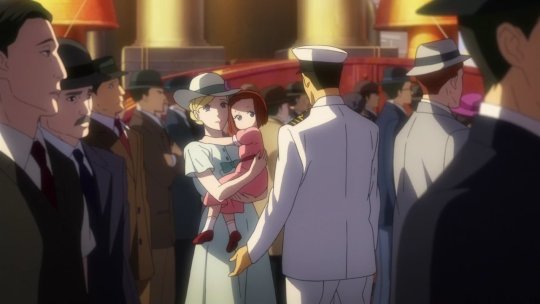
As he does so, he reveals that the woman’s surname is ‘Grane’. Amari has a revelation at this…
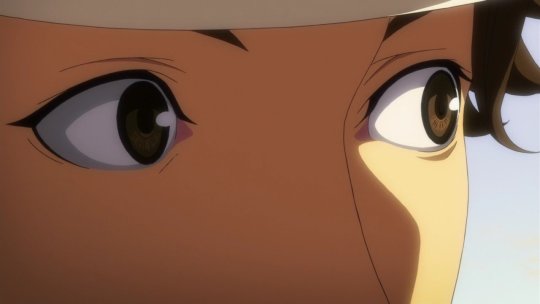
…and picks the passenger roaster. On it S. Grane and her daughter E. Grane are listed as traveling with a pet dog, Frate.

This causes Amari to figure out that the woman lied when she said the dog scared her as the dog was HER dog.

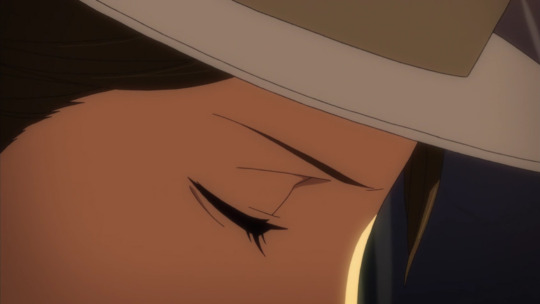
Amari whistles and calls Frate (in English because he’s an English dog…. ^_-). Frate arrives in a run and jumps in Utsumi’s arms. Evidently he’s not a shy or wary dog. Now… maybe there’s a reason for the whole thing (maybe due to some boat rule pet animals has to be left free to wander on the bridge?), but leaving Frate free to wander on the boat was pretty silly. Though it seems the meeting between Synthia and Amari in the novel didn’t happen as shown in the anime, so maybe in the novel the dog was left free for a purpose.
Anyway Amari claims he can explain Morgan’s death but needs a little time first. The two captains agree.
Let me point out for a moment how beautiful the sea is now that sunset is slowly coming…
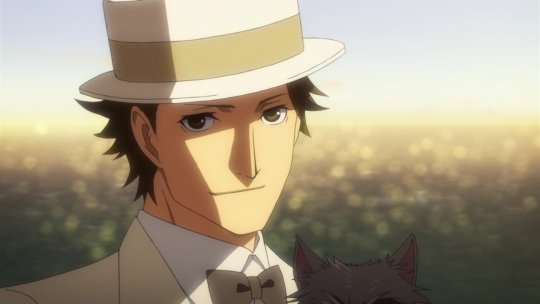
…before telling you that Amari turns to Synthia…

…who lowers her head as ‘Aitō’ [哀悼 Apologies] starts playing.
The scene switches, Amari and Synthia are talking. Emma is asleep in her mother’s arms, which is convenient but weird as she was fully awake moments before.
Amari asks Synthia if she’s Cerberus. She doesn’t reply.

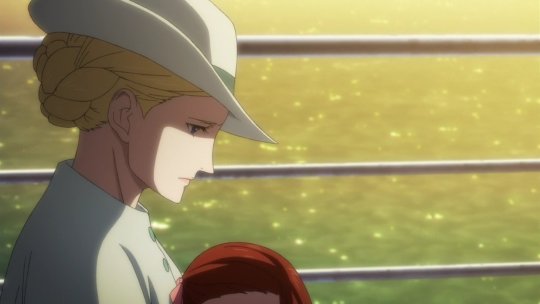
Amari claims that Frate isn’t like Cerberus but pulls out a photo from his collar and asks Synthia to explain it. In the photo there are McCloud before the plastic surgery and a sailor. The sailor is the one who died at the beginning of the episode, Raymond Grane.

Synthia turns her head away but Amari insists and asks her how did she know it was him. She admits she figured out as soon as she saw him due to the shape of his ears.
Remember? Amari talked about facial features that are unique. Those are the ears.
Synthia now explains how Emma felt ill after they left the port so, when she finally felt better Synthia started searching for McCloud’s ears. She saw him but also saw Frate, first at his feet, then running toward her, so she panicked because that photo was hidden in his collar.
Again, on the overall it’s weak. The real danger wasn’t the photo that was hardly visible, it was McCloud recognizing Frate or her or Emma. And yelling should have attracted his attention. Actually it was weird it didn’t as well as it’s weird she let Frate wander around when he had such a compromising document that caused her to panic.
Amari asked her why, since she completed her task, she didn’t get rid of the photo. Synthia replies that this is the most handsome photo she has of Raymond, her husband and Emma’s father… and even this the explanation is weak. All she had to do was to cut the McCloud part and keep Raymond.
Of course we can speculate that Synthia isn’t in the best mental state. She just betrayed her country to Germany (which physically killed her husband) to personally kill the man who caused the Germans to kill her husband, dragging along her small daughter and her dog. She also had admitted she spent all the days staring to that photo so as to memorize the shape of McCloud’s ears. There’s enough to suspect her mental sanity at the moment so it might make sense she’s not seeing such a simple solution. Synthia is full with hate for McCloud, evidently she’s not thinking straight.
‘Hifū [悲風 Sorrowful wind] starts playing.
Anyway Synthia says that now that she had killed McCloud she has no regrets. She doesn’t look exactly overjoyed or in peace though.
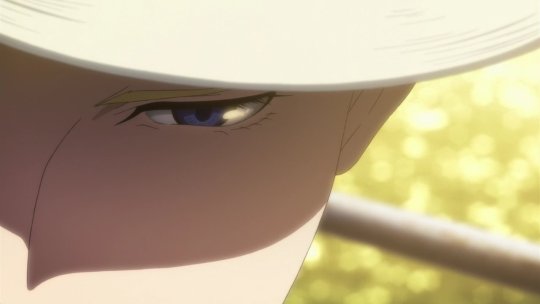
Amari tells us about how a German merchant raider sunk the English cargo on which Raymond Grane was the first mate. Remember how he said Gardening Plan when he was with Yūki? Those words were likely meant to explain this scene.
Anyway a flashback starts in which Synthia remembers the mourning ceremony for her husband, how McCloud joined her pretending to comfort her…


…how, searching for Emma, she ended up on overhearing what McCloud did, which was his Gardening plan, which seems to break her.
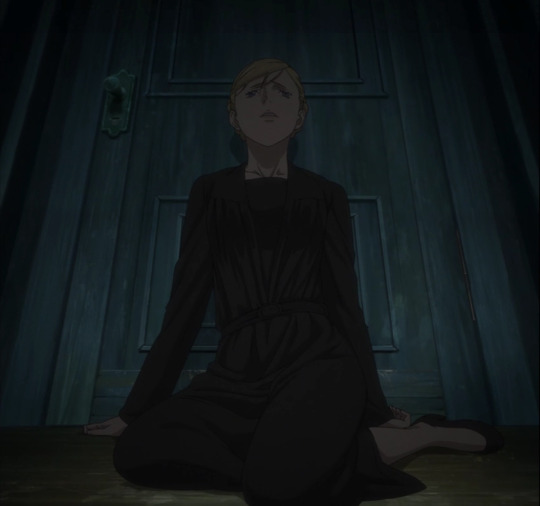
Personally I find the whole thing a bit dumb as the one talking with McCloud is basically yelling about a SIS plan that caused an English Cargo to be sunk.
True, there’s no one outside but someone could overhear… as it actually happens.
(On a sidenote can I praise again JG for its care in the details and for how pretty everything is? Look at the colour on the wooden door, they didn’t just paint it all of the same colour, they painted it so that it seems there’s paint over it and that part of it is coming away.)
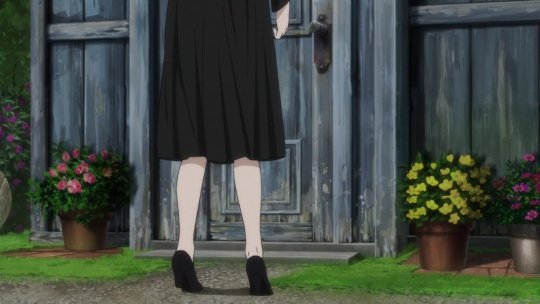
With this Synthia’s tale ends.

Amari then explains what happened afterward, how the German Navy used Enigma to encrypt the stolen orders and telegraph it to friendly troops, how the English intercepted that transmission and tried comparing the two messages. How this also caused McCloud to end up disavowed by the SIS.
Synthia is surprised he could know so many things, figuring there are mysteries in his life too.
She then admits she became a German spy to get her revenge so she’s ready to consequences but, when she watches Emma, she doesn’t know anymore what she lived for or what she should have lived for.
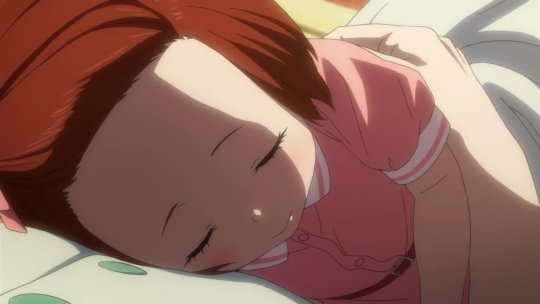
Emma makes a timely wake up and asks her what’s wrong.

Amari asks Emma if she wants to see the dolphins again. Emma agrees but the subtle message is for Synthia. Amari fundamentally volunteered to take care of Emma from now on.
‘Kansō’ [歓送 Farewell] starts playing.
Synthia agrees…


… and Amari walks away with Emma and Frate.
Next we see a scene of a man raising Emma, Frate jumping around them.

It might be hard to figure it out but that man isn’t Amari but Raymond, whom, in the novel was described as resembling Utsumi Osamu. Hence when Synthia entrusted Emma to Amari she sort of had the feeling to entrust her to her husband.
Synthia whispers a goodbye to Emma before standing up and consigning herself to the officers.
Amari and Emma are watching the sea but no dolphin is in sight so Emma asks if they’re taking a nap.


Amari claims they’ll see them tomorrow and Emma agrees, saying they’ll do it with her mother. Amari tells Frate he can come (see them as well) then, staring at the horizon wonders to his situation of now having to take care of Emma and Frate then decides it’ll work out somehow.
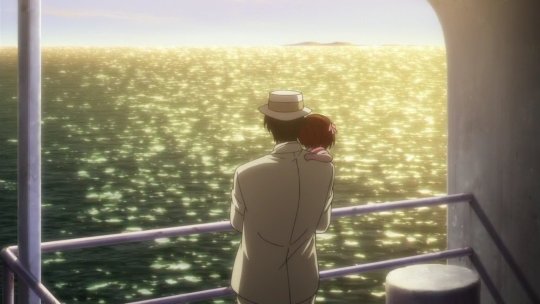
On the table we see the crossword puzzle. In it the word ‘life’ is bolded.
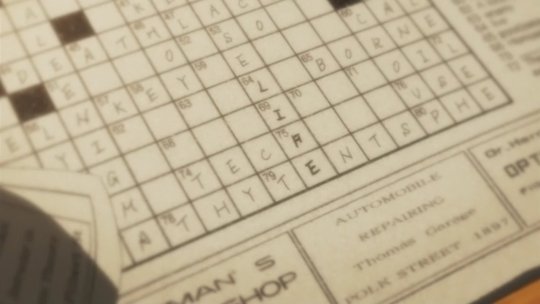
Hum… maybe it was better if it was ‘live’ but well, we get the message just the same.
And with this the episode ends.
Ending theme.
Overall this episode is visually beautiful and the drama behind the story is one of the best but… the mystery part is a mess. Even if some things can be excused there are still plot holes. Sure, it can be they’re due to the story being cut left and right but… well, it’s a pity.
The best one can do is to watch it for the story, which is lovely, and not for the mystery, which, for once, is the weakest point of the plot.
Oh, as you might have noticed this time I didn’t pause much to describe scenes visually as there were almost no special visual shoots. It doesn’t mean they were bad, everything was really, really pretty, but we didn’t have neither smart nor subtly meaningful shots. So, beyond saying that something is very aesthetically pleasing there wasn’t much to say about the visual.
Maybe the only thing that’s noteworthy is that there are a good amount of close up and "Italian shot" or Extreme Close Up in which only the character’s eyes are visible to better express the feelings of said character but that’s not that out of ordinary in anime.
And this was Joker Game Ep 7. Thank you to everyone who was brave and patient enough to sit through my long, long ramblings for the whole episode. I hope other people will feel like sharing what they had observed while watching it!
#Joker Game#Amari#Utsumi Osamu#Emma Grane#Synthia Grane#Joker Game ReWatching#Raymond Grane#Louis McCloud#Jeffrey Morgan#Hara#Yuasa#Yuuki#JG Code Name Cerberus#Joker Game Anime
15 notes
·
View notes